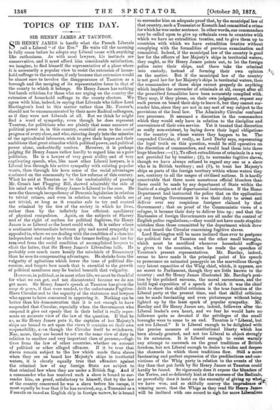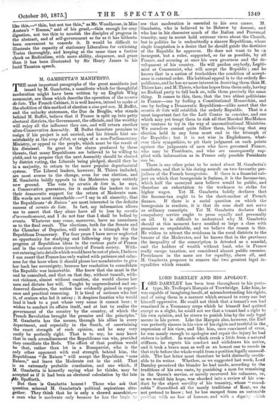TOPICS OF THE DAY.
SIR HENRY JAMES AT TAUNTON.
SIR HENRY JAMES is hardly what the French Liberals call a Liberal "of the Eve." He waits till the morning is fully come before he adopts any Liberal cause with anything like enthusiasm. As with most lawyers, his instincts are conservative, and it must afford him considerable satisfaction, we imagine, to find himself the representative of a place where it is necessarily a popular view to resist the extension of house- hold suffrage to the counties, if only because that extension would be almost sure to involve the disappearance of Taunton as a borough and the merging of its representative force in that of the county to which it belongs. Sir Henry James has nothing but harsh criticism for those who are urging on the country the extension of household suffrage to the county electors. We agree with him, indeed, in saying that Liberals who follow Lord Hartington's lead in this matter rather than Mr. Forster's, should not be excommunicated by their more Radical colleagues, as if they were not Liberals at all. But we think he might find a word of sympathy, even though he does represent Taunton, for politicians who see plainly that some measure of political power is, in this country, essential even to the social progress of every class, and who, entering deeply into the miseries of the agricultural labourers, wish to give their hopes and their ambitions that great stimulus which political power, and political power alone, undoubtedly confers. However, it is perhaps judging Sir Henry James rather hardly to regard him as a pure politician. He is a lawyer of very great ability and of very captivating speech, who, like most other Liberal lawyers, is a Liberal less through his active sympathy with existing popular wants, than through his keen sense of the social advantages conferred on the community by the law reforms of this century. What he said at Taunton as to the undesirability of passing Mr. Cross's last Flogging Bill, showed admirably the side of his mind on which Six Henry James is Liberal to the core. He sees the thorough inexpediency of Draconic legislation in relation to trivial crimes, and even in relation to crimes which are not trivial, so long as it remains safe to try and control the criminal by the ties of the society in which he lives, rather than by the infinitely less efficient, machinery of physical compulsion. Again, on the subjects of Slavery and of the right of asylum for political fugitives, Sir Henry James is as Liberal as the heart could wish. It is rather where a sentiment intermediate between pity and moral sympathy is appealed to, where we are dealing with the condition of a class too independent and sturdy to elicit the former feeling, and too far removed from the social condition of accomplished lawyers to elicit the latter, that Sir Henry James's Liberalism fails. He probably sees much more keenly the mischiefs of Democracy than he sees its compensating advantages. He shrinks from the vulgarity of agitations which lower the tone of political dis- cussion, and forgets how much that is essential to the growth of political manliness may lie buried beneath that vulgarity.
However, in political, as in most other life, we must be thankful for what we can get, and not discontented because we do not get more. Sir Henry James's speech at Taunton has given the coup de grace, if that were needed, to the unfortunate Fugitive- Slave Circular and to the sagacity of the statesmen and lawyers who appear to have concurred in approving it. Nothing can be better than his demonstration that it is not enough to have suspended that Circular, especially when the Government who suspend it give out openly that in their belief it really repre- sents an accurate view of the law of the question. If that be so, as Sir Henry James puts it, the captains of her Majesty's ships are bound to act upon the views it contains on their own responsibility, e /en though the Circular itself be withdrawn. Nay, more, they are bound to act on the same view of duty in relation to another and very important class of persons,—fugi- tives from the law of other countries, whether on account of political or other alleged offences. If it be true that slaves remain subject to the law which made them slaves when they are on board her Majesty's ships in territorial waters, it is clearly equally true that offenders against the criminal law of any foreign State are subject to that criminal law when they are under a British flag. And if a commander who has received such a slave is bound to sur- render him, on proof, satisfactory to himself, that by the law of the country concerned he was a slave before his escape, it must equally be true that if he has received, say, a Toussaint or a Eossuth on board an English ship in foreign waters, he is bound to surrender him on adequate proof that, by the municipal law of that country, such a Toussaint or Kossuth had committed a crime for which he was under sentence. In other words, our coramandera may be called upon to give up critninals even to countries with which we have no extradition treaties and to give them up to- countries with which we have extradition treaties without complying with the formalities of previous examination and committal. Indeed, if the municipal law of the country is good law for the officers of her Majesty's ships in territorial waters,. they ought, as Sir Henry James points out, to let the foreign police enter their ships and there take the criminal into custody, instead Of forming their own opinion on the matter. But if the municipal law of the country is not good law for her Majesty's ships in territorial waters, then the commanders of those ships cannot properly do anything which implies the surrender of criminals at all, except after all the prescribed formalities have been accurately complied with. They may, if they please, on their own judgment, request any such person on board their ship to leave it, but they cannot sur- render him, since they are not in any sort of way subject to the provisions of the local law. The Admiralty Circular confused two processes. It assumed a discretion in the commanders which they would only have in relation to the discipline and, convenience of their own service. Yet it treated that discretion as really non-existent, by laying down their legal obligations
to the country in whose waters they happen to be. The suspended Circular, if really, as Lord Derby says, representing the legal truth on this question' would be still operative on
the discretion of commanders, and would lead them into three- huge blunders :—(1), To effect extraditions of criminals in a way not provided for by treaties ; (2), to surrender fugitive slaves,. though we have always refused to regard any one as a slave- who is in British territory ; and (3), to treat her Majesty's- ships as parts of the foreign territory within whose waters they are, contrary to all the usages of civilised nations. It is hardly conceivable that three more monstrous official blunders thaw these could be made by any department of State within the limits of a single set of departmental instructions. If the Home. Department had instructed the police that on the applic,atiom of any foreign Government it was their duty to arrest and deliver over any suspicious foreigner claimed by that Government that on proof of the Communistic views of a refugee, it became their duty to deliver him up ; and that the- Embassies of foreign Governments are all under the control or English police regulations,—they would not have made stupider mistakes than those committed by the department which drew- up and issued the Circular concerning fugitive slaves.
Lord Hartington will be more inclined than ever to postpone the political fate of Taunton and the other small boroughs,. which must be sacrificed whenever household suffrage is given to the counties, when he reads the speeches of Taunton's present representatives. Mr. Barclay, indeed,. seems to have made it the principal point of his speech to pronounce an animated panegyric on the marvellous though very latent capacities of the Whig chief, which, it appears, are- no secret to Parliament, though they are little known to the- country ; and Sir Henry James illustrated Mr. Barclay's posi- tion by the polished sarcasm, the moral earnestness, and the lucid legal exposition of a speech of which it was the chief drift to show that skilful criticism is the true function of the Liberal party at the present time, and that skilful criticism can be made fascinating and even picturesque without being lighted up by the least spark of popular sympathy. Mr.. Barclay and Sir Henry James are, indeed, followers after the Liberal leader's own heart, and we fear he would hate no followers quite so devoted if the privileges of the small boroughs were to come to an end. Taunton is "Liberal, but not too Liberal." It is Liberal enough to be delighted with the precise measure of constitutional liberty which has been already granted, and not too Liberal to object strongly to its extension. It is Liberal enough to resist warmly any attempt to encroach on the great traditions of British freedom, but not Liberal enough to desire to widen and deepen the channels in which those traditions flow. Still a more fascinating and perfect expression of the predilections and con- victions of the Whig party in relation to the events of the day than that put forth by Sir Henry James at Taunton could hardly be found. So vigorously does it expose the blunders of the Tories, and so delicately hint at the excesses of the Radicals, so powerfully does it insist on the enormity of giving up wha-- we have won, and so skilfully convey the imprudence winning more that the Whigs as they read Sir Henry, James will be inclined with one accord to sigh for more Libundiem
like this,—" thin, but not too thin," as Mr. Woodhouse, in Miss Austen's "Emma," said of his gruel,—thin enough for easy digestion, not too thin to nourish the disciples of progress in the abstract, and of self-government so far as it has hitherto been convenient to concede it. It would be difficult to illustrate the capacity of stationary Liberalism for criticising Tories thoroughly, and keeping at the same time a furtive check on Radicalism, with more ability, eloquence, and grace than it has been illustrated by Sir Henry James in his lucid Taunton speech.



































 Previous page
Previous page